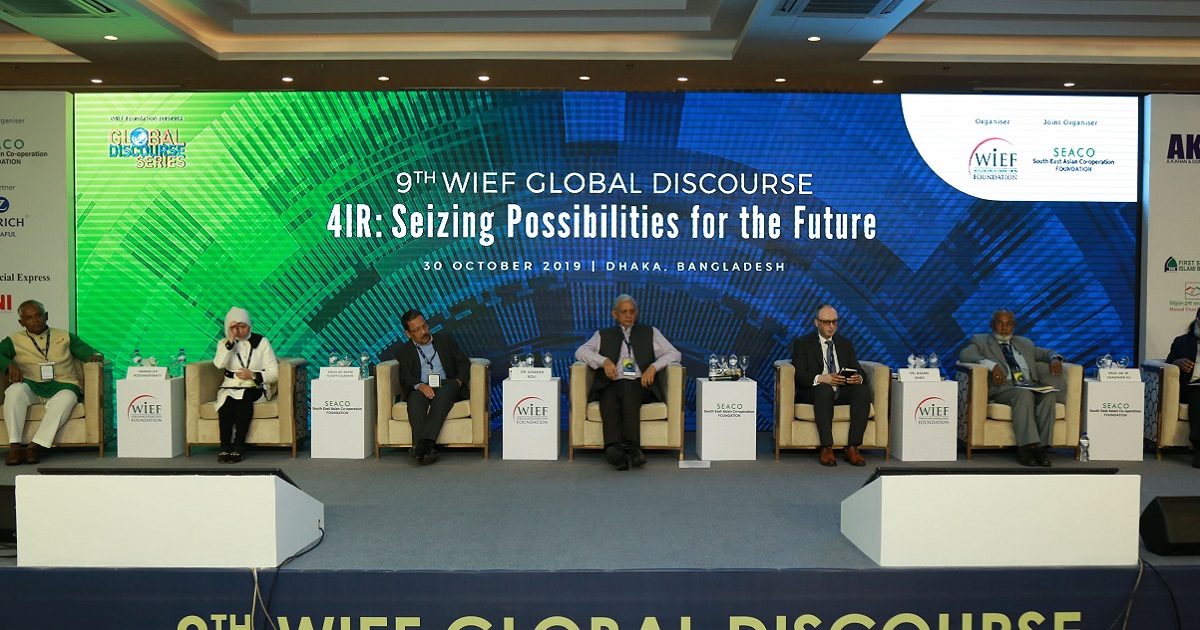9th Global Discourse on 4IR Part 1
The 9th WIEF Global Discourse in Dhaka identifies important social, economic, political and environmental trends that has shaped, and will further shape, the 4IR. Here’s part one of two summaries of the half-day discourse themed 4IR: Seizing Possibilities for the Future.
Today, we stand on the brink of a technological revolution that changes how we work, live, learn, relate to one another and even what it means to be human. The 9th WIEF Global Discourse discussion on the Fourth Industrial Revolution (4IR) engages this fact. A knowledgeable panel shares their insights and expertise in identifying the important social, economic, political and environmental trends that shape the 4IR.
Development of technologies is progressing at an unprecedented rate compared to previous industrial revolutions. It’s this rapid transformation that’s blurring the boundaries between the physical, digital and biological spheres leading to changes of a disruptive nature. Session moderator Syed Tamjid ur Rahman, vice president of the Bangladesh Center for the Fourth Industrial Revolution (BD4IR), points out that, ‘the evidence of dramatic changes is all around us and is happening at an exponential state’. We need to understand this progress and actively engage with it, in order to not be, quite literally, left behind.
At the outset, Professor Dr M. Shamsher Ali, professor emeritus at Southeast University and founder Vice Chancellor of the Bangladesh Open University demonstrates how the developments that have signalled the previous industrial revolutions have catapulted humankind into a different way of life. Panellists agree that the 4IR has the ability to do the same and then some. What’s different now, is the breadth, depth and pace of developments and, indeed, the impact they have. It’s agreed that ensuring this impact is positive, requires steady, proactive progress and development.
Amidst these changes, panellist Professor Dr M Anwar Hossain, a member of the Board of Governors of the SEACO Foundation and first Vice Chancellor of the Islamic University of Technology in Dhaka, considers the manpower needed to support and progress the 4IR. People’s skills are an important consideration. Professor Anwar suggests that the entire pedagogy of skilling the 4IR workforce needs a rethink, ‘I think we should give emphasis on training of the mind of these students so that they are flexible and capable of logical and critical thinking and can acquire knowledge and skills of various types and levels quickly on their own as well. To achieve this, we have to examine our existing curricula including focus on mode of teaching learning.
‘To supply matching manpower at all levels of production and services, as well as to help inform users of technologies, the focus and mode of formal education at all levels needs to be looked into, particularly keeping in mind that, due to fast changes and varied applications of the technologies, one will have to adjust and readjust jobs several times during their whole professional life. That means it’s a question of lifelong learning through self-learning, training and retraining at the workplace and at department level,’ Professor Anwar continues. Admittedly, this is easier said than done. ‘We know some of our countries have made some progress in this regard but still we have to go a long way. It is a dynamic process’. To achieve this, Professor Anwar proposes a regional collaboration in the education at institutional level to further assemble and work together to help develop the right kind of workforce to meet the challenges of the 4IR.
Panellist Dr Hasan Shafi, a partner at consultancy firm A.T. Kearney, Inc in Malaysia, advises global clients in corporate, government and other organisations, helping them to devise longer term strategies and implement fundamental transformative changes that are beneficial for these clients. With a focus on production, he affirms that there’s no denying the fact that this 4IR brings significant opportunity for many nations including Bangladesh, yet acknowledges that different countries are at different levels of maturity, and so, are in need of a strategic plan of action. ‘There’s no point in trying to do a lot of things in a lot of sectors. It’s going to be a waste of everyone’s effort and money,’ he says. ‘Macroeconomic indicators suggest that there’s an opportunity for Bangladesh, however, the country is at a very nascent stage of readiness with respect to the 4IR. A robust strategic outlook will serve to guide key decisions for the country.’
Questions needing address include: whether the country should focus its efforts on past successes, such as in the garment industry, invest in future capabilities, regional collaboration opportunities, different ways of entering or growing within selected sectors, the future view of these sectors, the labour force that exists and is needed in future and the investment required to achieve the strategic plan. In drafting and, indeed, implementing this plan, Dr Hasan emphasises the need for collaborative efforts from government, business, academia, organisations and startups.
While there are aspects of the future that no one can anticipate, it’s pretty clear that future industries, future jobs, and the like, may be out of scope of our current imagination, but something that we can get ready for. ‘Clearly there’ll be job losses but the beauty of Fourth Industrial Revolution is that it will create jobs and opportunities that no one today can think of. We just have to get prepared for that,’ Dr Hasan adds.
Panellist Dr Mohd Yusoff Sulaiman’s role as president and CEP of the Malaysian Industry-Government Group for High Technology (MIGHT) is to advise the government on high-tech industry developments and how these can be used to benefit the country’s economy. ‘[In Malaysia], in addressing the Fourth Industrial Revolution we have a plan called the Industry Forward by the Ministry of International Trade and Industry. But technology is the last thing that’s being considered. The first important thing other than technology would be your funding, your infrastructure, your regulation and your skills,’ says Dr Yusoff. ‘This is a journey that every country is actually going through.’ Dr Yusoff highlights a number of challenges with this journey. The application of technological developments and the opportunities those developments unlock further proves a constant, iterative process.
He notes regulation, ownership of technological processes and ownership of branded products as some points of consideration in building an ecosystem for the 4IR change.
Panellist Mahtab Uddin Ahmed, managing director and CEO of Robi Axiata Limited in Bangladesh paints a sink or swim scenario and insists on a proactive approach for Bangladesh. ‘If we don’t cope with these changes, one day we’ll find that we are irrelevant in this market place,’ he reminds and asserts the need for definitive policy that understands the changing landscape and the people involved. ‘Bangladesh has a lot of talent but I don’t think our policy makers really understand the talent our people have. That talent, if properly guided, can actually avail the opportunity we can see out of the 4IR.’
According to Mahtab, as a country, Bangladesh has three choices. One, is to simply go with the flow – whenever the 4IR hits, go with the flow. Two, follow the example of China and Korea and be a fast mover. Or three, see these changes as simply an opportunity to make more money. The crux of the 4IR is, however, its transformative ability. ‘So, having said everything, I think we’ve got a huge advantage of having a massive population. This population set, educated populations, young populations, if we give them the right education and direction, I think we can transform Bangladesh into a golden digital Bangladesh,’ says Mahtab.
Panellist Siti Rozaimeriyanty Haji Abdul Rahman, director and principal architect at Eco Bumi Arkitek and Legislative Council Member in Brunei, notes a digital divide and increasing inequality regionally and internationally. Inequality of access opportunities. ‘The 4IR is not just technology driven change. It is an opportunity to help everyone, including leaders, policy makers, businesses and people from all income groups and nations to harness the converging technologies in order to create an inclusive human centred future,’ she says. ‘The real opportunity is to look beyond the technology and find ways to give the greatest number of people the ability to positively impact their families, organisations and communities’.
The World Economic Forum reports that 65 per cent of children entering the primary school today will work in jobs that has yet to exist. So, a shift in skills require a job market in the era of 4.0 whereby an increase in demand for technical skills. Not all can enter universities but, Siti Rozaimeriyanty believes that, ‘what we need is inclusivity where technical schools can actually help to harness skill sets. We need to do is to train students for the jobs of tomorrow as training them for the jobs of today is no longer relevant. It is important for the leaders together to shape a future of work for all by putting people first, empowering them and constantly reminding ourselves that all of these technologies are first and foremost tools made by the people for the people.’
Session moderator, Syed Tamjid summises that the mission should be to develop capacity, conduct more research, do the risk analysis, map challenges and opportunities and develop technical cooperation to maximise the benefits as well as minimise the risk of the 4IR. Forums such as these are intended to help accelerate growth and drive positive change by bringing politics, government, ministries, business, industries, academia, researches, civil society and the international organisations from Bangladesh as well as around the world to work together across emerging new revolutionary disruptive 4IR. ‘Despite technological changes we need to see how we can harness these changes for social economic development, and I think, it’s very important since we know that shift means that we live in a time of great promise and at the same time great disruptions a well,’ he says.
However, we have serious concerns that organisations might be unable to adapt, government could fail to employ and bring new technologies to capture their benefits, while shifting power will create new security concerns, inequalities may grow and societies may fragment. The key technologies driving this revolution will have the major impact on government, businesses, civil society and individuals, and there’s need to find ways to respond. ‘At the heart of this discussion is the conviction that the 4IR is within the control of all of us as long as we are able to collaborate across geographies, sectors and disciplines to grasp the opportunities it presents,’ concludes Syed Tamjid.
For details on the Global Discourse programme and bio of each speaker, visit event webpage. Read part 2 of the summary of the 9th Global Discourse in Dhaka here.



